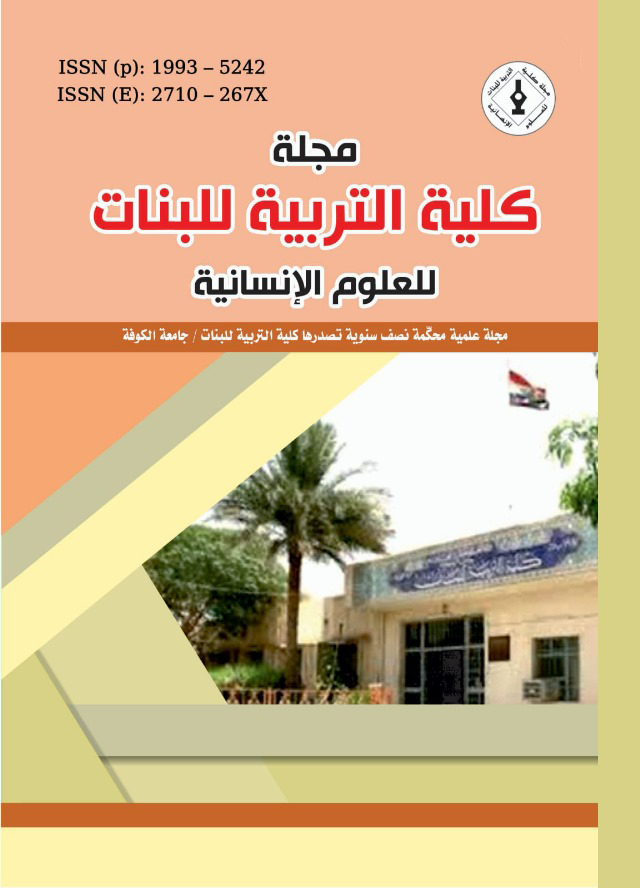Abstract
When the Qur'an was published in the Arabic language, they were astonished, and they were the people of eloquence and eloquence of his eloquence and eloquence, and were unable to do the same, despite their knowledge of the language, its arts and methods, and stood before the eloquence of the Qur'an and its eloquence and methods, unable to come. With a verse like his verses, and from the moment he came down to this day, scholars give him their sciences towards him, eloquence and pureness, as well as linguistic studies, but the ancient Arabs did not study the language in itself and for its own sake, as their concern was to show its connection to the Qur'an As for the tongues, they took care of the language itself, and made it a tool for reporting and communicating
The research came here under the title "The exquisite pilgrims in the verses of the( AL-MUKANNA ,and AL-MUBANNA , and opaque proper name) dealing with the deliberative interest in the communicative process, and exceeded by the formal view of the language, when the view of the art of the exquisite as a formal and aesthetic decoration of speech, deliberative opened up new horizons by giving him a pilgrim role in the speech on which the speaker relies to make an impact on the recipient and convince the sender tries to employ different strategies to communicate with others in order to influence them .
Thus, deliberativeness has taken al-Badia out of the limit of improving speech to reportin and reporting, and therefore we try in this research in accordance with the strategy of persuasion to monitor the exquisite improvements in the verses of, ( AL-MUKANNA ,and AL-MUBANNA , and opaque proper name) and to show their effect in persuasion, which is the purpose of the pilgrims.
The research came here under the title "The exquisite pilgrims in the verses of the( AL-MUKANNA ,and AL-MUBANNA , and opaque proper name) dealing with the deliberative interest in the communicative process, and exceeded by the formal view of the language, when the view of the art of the exquisite as a formal and aesthetic decoration of speech, deliberative opened up new horizons by giving him a pilgrim role in the speech on which the speaker relies to make an impact on the recipient and convince the sender tries to employ different strategies to communicate with others in order to influence them .
Thus, deliberativeness has taken al-Badia out of the limit of improving speech to reportin and reporting, and therefore we try in this research in accordance with the strategy of persuasion to monitor the exquisite improvements in the verses of, ( AL-MUKANNA ,and AL-MUBANNA , and opaque proper name) and to show their effect in persuasion, which is the purpose of the pilgrims.
Keywords
effect
Persuasion
The exquisite pilgrims
Abstract
لمّا نزل القرآن الكريم بلغة العرب تعجّبوا وهم أهل فصاحة وبلاغة من فصاحته وبلاغته وعجزوا عن الإتيان بمثله . فعلى الرغم من معرفتهم باللغة وفنونها وأساليبها وقفوا أمام فصاحة القرآن وبلاغته واساليبه عاجزين على أن يأتوا بآية من مثل آياته ، ومنذ لحظة نزوله إلى يومنا هذا ينهل العلماء منه علومهم نحواً وبلاغةً وصرفاً ، فضلا عن الدراسات اللسانية ، ولكن العرب القدامى لم يدرسوا اللغة في ذاتها ومن أجل ذاتها ، إذ كان همّهم بيان صلتها بالقرآن الكريم ، أمّا اللسانيون فقد اهتموا باللغة لذاتها ، وجعلوها أداة للتبليغ والتخاطب . جاء البحث هنا تحت عنوان ( حجاجية البديع في آيات المكنّى والمبنّى والأعلام المبهمة ) يتناول ما جاءت به التداولية من الاهتمام بالعملية التواصلية ، وتجاوزها النظرة الشكلية للغة ، فحين كانت النظرة إلى فن البديع على أنّه زخرف شكلي وجمالي للكلام ، فتحت التداولية آفاقاً جديدة بإعطائه دوراً حجاجياً في الخطاب يعوّل عليه المتكلم ليحدث تأثيراً في المتلقي وإقناعاً فالمرسل يحاول أن يوظف استراتيجيات مختلفة للتواصل مع الآخرين رغبة في التأثير فيهم . وبهذا تخرج التداولية البديع من حد تحسين الكلام إلى التبليغ والإبلاغ ، وبناء على ذلك نحاول في هذا البحث ـ وفقا لاستراتيجية الإقناع ـ رصد المحسنات البديعية في آيات المكنّى والمبنّى والأعلام المبهمة ، وبيان أثرها في الإقناع وهو غاية الحجاج .
Keywords
حجاجية البديع ، الإقناع ، الكنية ، الأثر.
